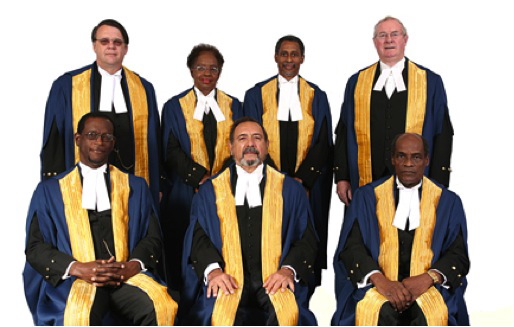Above: the Caribbean Court of Justice
By Alexander Britell
Belize saw its first-ever judgment from the Caribbean Court of Justice, with the court finding that the Attorney General was allowed to bring an action for misfeasance in office against two former ministers, Florencio Marin and Jose Coye, alleged to have wrongfully sold government land.
The Attorney General of Belize had filed the claim against the ministers alleging that, during their time in office, they had arranged the transfer of 56 parcels of state-owned land to a company that was beneficially owned and/or controlled by one of them.
The claim of misfeasance in tort involving public officials had typically been extended only to private citizens or classes of persons, but the court upheld the Court of Appeal’s ruling that it could be extended to an action by the Attorney General, although it used slightly different reasoning.
CCJ Justice Desiree Bernard noted that while “all of the cases on the tort of misfeasance brought in the jurisdiction where it has been utilized have been at the instance of individuals,” not state officials,”at the end of the day” it was the duty of the Attorney General to preserve the patrimony of Belize by “recovering financial loss from those allegedly responsible for undervaluing national lands in their quest for personal financial gain.”
The five-judge panel originally heard the case in November included former CCJ President Michael de la Bastide. Bastide was replaced by Sir Charles Michael Dennis Byron in March.
The dissent argued that such cases were within the purview of the criminal law, and that the tort should not encompass civil actions by the state.
The original action, Attorney General of Belize v Florencio Marin and Jose Coye, alleged that the consideration paid by the purchasing company was $1 million below market value, and that it had been transacted without lawful authority and in bad faith. The action involved a single cause of action — misfeasance in public office.
Attorney Magali Marin Young declined to comment on the case. Co-defense counsel Elson Kaseke could not be reached for comment.
The Belize Court of Appeal had reversed a decision by the Supreme Court of Belize, finding that former ministers could be held liable in misfeasance for loss of public property, and that the Attorney General was the proper party to institute proceedings.
Attorneys Nigel Ovid Hawke and Lois Michelle Young SC, who represented the Attorney General, were similarly unavailable for comment.
The case cited to fairly broad precedent — from a decision by the House of Lords in Brayser v. McLean, to the Privy Council’s ruling in Three Rivers District Council v. Bank of England to the Inter-American Convention against Corruption, to a number of Indian cases on which the Court of Appeal had focused (although the court disagreed with the Court of Appeal’s understanding of the Indian precedent).
The CCJ found that, while the Attorney General’s action was “unprecedented,” there was no “sufficient reason” to deny the logic of the developments of the tort of misfeasance and what the court termed “evolution of the corporate nature of the State in the law of torts.”
The question of the CCJ has returned to Caribbean news of late, with several governments divided over whether to retain the London-based Privy Council or to sign on to the CCJ, as three countries — Belize, Guyana and Barbados, have already done. Belize joined the court last year.
The case is now headed back to the Supreme Court.
